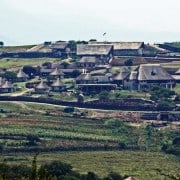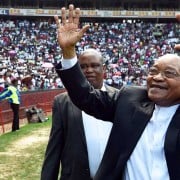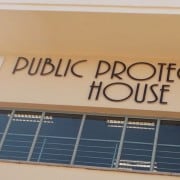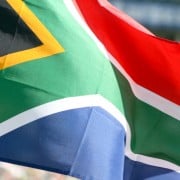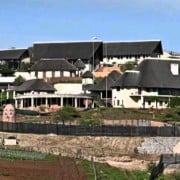|
Getting your Trinity Audio player ready...
|
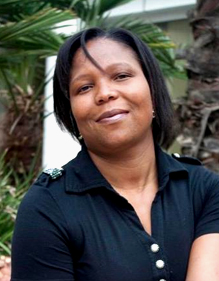 By Valentia Talane
By Valentia Talane
Mmanaledi Mataboge is the Mail & Guardian's political editor. She studied journalism at the Tshwane University of Technology, which back then was known as the Technikon Northern Transvaal, and since then has built a successful career in radio, television and newspaper, with City Press, M&G, the SABC, and e.tv.
Mataboge names City Press editor-in-chief Ferial Haffajee, former City Press editor-in-chief Mathatha Tsedu, and former deputy president of South Africa, Phumzile Mlambo-Ngcuka, among her role models.
We interviewed this bold media veteran as part of our Woman’s Month series, which celebrates women who are active in the fight against corruption. Read the first two articles, featuring Transparency International's Nicky Rehbock and the Open Democracy Advice Centre's Gabriella Razzano.
When did you know for the first time that you wanted to be a journalist?
In 1996 when I had taken a break from school after completing my Grade 12. Community radio stations were just being introduced and I listened to three in the area where I lived, comparing the news content and wondering if anything can be done to improve that. One of them, TNTFM (it belonged to the former Technikon Northern Transvaal) caught my attention with its better quality content and I decided that I’m going to make a contribution by becoming one of those news readers. I enrolled at TNT the following year and journalism was the channel through which I could get to work in news.
Did you always want to focus on politics in your work?
Not at all. I saw myself as a general news reporter because people’s stories were what I wanted to tell. With time however, I realised that politics run our everyday lives and we cannot separate people’s struggles from politics.
Does the South African press focus only on the negative with regards to our government?
No, it does not. I however believe we do not tell enough of the positive stories. There’s a good reason though for highlighting more of corruption related stories and wasteful expenditure in government because the disadvantage of corruption and wasteful expenditure is that service delivery suffers while funds allocated for improving people’s lives and developing the country are being wasted.
Your views on corruption in South Africa?
Corruption is a cancer that’s taking away from us and needs to be fought until it stops. It destroys opportunities of building the South Africa that we are all dreaming of and should not be tolerated. Unfortunately because of the way our government has been soft on corruption over the years, some South Africans have become desensitized to corruption and view it as part of life. There are some efforts here and there to be tough on corruption, but it’s not nearly enough.
What is the most gratifying thing about your job?
When a story we have published results in action to fix that which was wrong and brings a sense of pride to South Africa.
Which corruption story – cracked by you or your paper – still gives you goose bumps today when you think of it?
The upgrades to President Jacob Zuma’s Nkandla property still make me want to scream out my anger. It is one of the greatest injustices done to South Africans since the advent of democracy. It is insensitive to the poverty that still affects our country and a smack in the face, particularly for voters who have been putting their faith in the ANC one election after the other.
What is your view on freedom of expression in general, be it of the individual or media outlet?
Freedom of expression is enshrined in our country’s constitution and should be protected. We however, as both the media and individual citizens, need to understand that freedom of expression comes with responsibilities. We must not abuse that right to harm other people.
Have you had the experience of your freedom being threatened because of an article you wrote or view you expressed publicly?
Several times, particularly after the ANC started discussing the media tribunal option. I’ve had senior politicians screaming in my ear over the phone and sometimes I laugh at them, especially when I believe they’re being unreasonable or trying hard to threaten me. It has become part of the package and one learns to work around it.
A young journalism graduate walks up to you today and asks you for career advice. What’s your response?
Learn as many skills as you can. The introduction of converged newsrooms because of the growing digital aspect requires that journalists do everything from shooting and editing their own videos, doing podcasts, blogging and being present on every other social media platform.
What lies beyond heading up the M&G’s politics desk for you?
For now my focus is on growing as the M&G’s political editor. I’ve only been in the position for four months and I need to give it time. Beyond this, I still want to remain in the media industry and contribute as much as I possibly can to educating and empowering my fellow South Africans to participate in our country's democracy.


